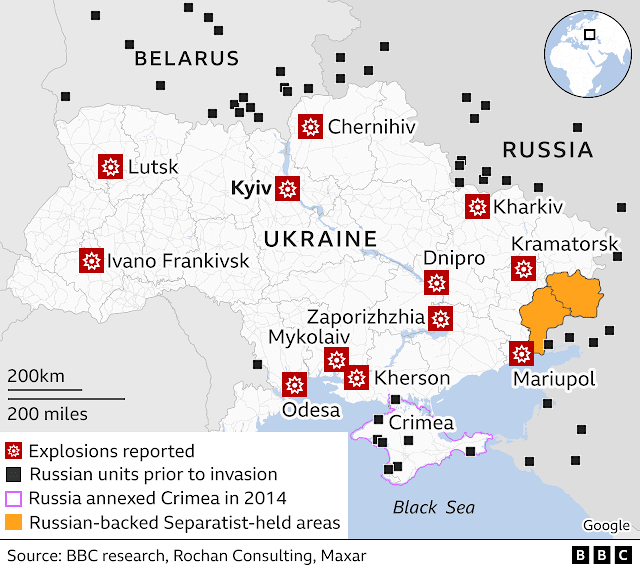TOPIC: A Middle Eastern Food Crisis Exacerbated by Putin's War
It is no secret that the Russian invasion of Ukraine has threatened the supply of food across the nation. But the disruption to food supplies is now having a far larger impact than just in eastern Europe. According to the UN Trade and Development Agency, Ukraine and Russia account for 27% of the worlds wheat exports, 53% of sunflower seeds and oil exports, as well as being key exporters of fertilisers and hydrocarbons. The Russian invasion has disrupted the flow of these goods, as well as disrupting the Ukrainian planting season and spring harvest, with workers, logistics and machinery alike diverted towards the war effort.
The Impact on the Middle East
Ukrainian access to its Black Sea ports from which it would usually export its goods are already limited due to the conflict. On top of this, the Ukrainian government understandably banned the export of grain and other food products at the beginning of the invasion to ensure its own domestic supplies. Russia on the other hand faces heavy sanctions, which have limited its ability to import and export goods. For Middle Eastern countries this is a particular issue, as on average, they usually acquire around half of their wheat imports from Russia and Ukraine. However, this only tells half the story. Certain countries are far more vulnerable, with Egypt receiving 80% of its wheat imports from Ukraine and Russia, Sudan 92% and Lebanon a debilitating 96%. To compound the issue, the worldwide increase in fuel prices will further increase the cost of importing wheat and other staple foods from distant continents.
 |
| Starvation, drought and human suffering have long been forced on the Yemeni people. Lack of supply is only like to increase their suffering. Image Credit: Jennifer Bose/CARE |
Yemen is another nation likely to be hard hit, having already suffered nearly a decade of internal conflict, along with drought and supply disruptions. 40% of Yemen's wheat imports come from Russia and Ukraine, where half of the country's population are already experiencing a high level of food insecurity. The disaster in Ukraine also takes away much needed funds and attention from the suffering Yemeni people. Syria is much the same, suffering persistent drought and destruction of its infrastructure across the previous decade of civil war. Russia recently suspended a December 2021 agreement to supply the Assad regime over a million metric tons of wheat, leaving the Russian ally vulnerable to shortages. Lebanon on the other hand, whilst spared the recent scale of conflict seen in Yemen and Syria, is nearly completely dependent on Russo-Ukrainian wheat supplies. What compounds the issue for Yemen is the corruption of its elites, that have forced immense economic suffering on its populace, with three quarters of the population living in poverty. Indeed, the August 2020 Beirut port explosion adds to salt to the wound, with Lebanon losing much of its capacity to store grain, if it ever arrives.
Egypt's Catastrophe
Historically, Egypt was renowned as the 'bread basket' of the ancient world. Now, the country of over 100 million people is a nation hugely dependant on imported wheat and is feeling the strain of Russia's invasion. In 2020, Egypt imported 13 million tons of wheat, of which 11.3 million came from Ukraine and Russia. The Egyptian PM announced in late February that the nation had a supply of four months, which would be extended to nine months by the domestic harvest that begins in April. In order to preserve its supply, the government banned exports of wheat for three months and initiated talks with other nations to secure more. In Egypt, the issue of bread is a particularly contentious issue. Already, it spends $3 billion annually to subsidise the bread prices for roughly two-thirds of the population. In 2016, President Abdel Fatah al Sisi declared that the subsidies for bread would 'never' be touched. Yet last August he was forced to announce that the subsidy would indeed be reduced. For Sisi, it is a risky political decision. In March 2017 angry demonstrations broke out in reaction to cuts in the amount of subsidised bread, while in 1977 bread riots left 79 dead and over 500 people injured.
The issues of supply are furthered in Egypt by the countries poor financial position. The war in Ukraine among other things, caused an accelerated exit of capital from Egyptian bond markets, whilst a decision to float the currency exchange rate led to a 15% depreciation of the Egyptian pound, something that has likely already contributed to the rise in inflation. The price of unsubsidised bread jumped 50%, with Sisi forced to urge Egyptians to ration their food consumption during Ramadan. The Egyptian government has been trying desperately to get a grasp on the situation, having opened financial dialogue with its allies across the Red Sea in Riyadh and the United Arab Emirates. So serious is the situation, that Egypt has even approached the International Monetary Fund for 'support'. But IMF help often comes with a caveat and as such, the impact of Russia's war on Ukraine will likely continue to harm the living standards of people in the Middle East for some time to come.



Comments
Post a Comment